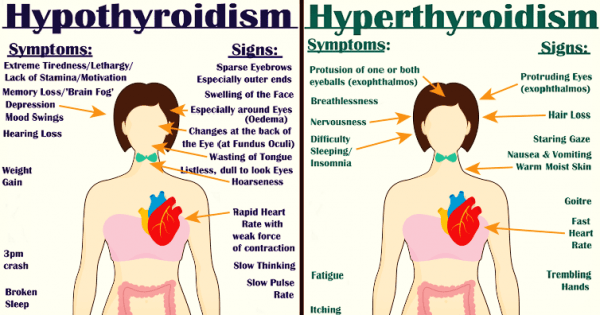
Hormones help our bodies run properly, but when they are out of balance there can be a host of problems. Thyroid disorders are the most common endocrine disorders and it’s important to know their signs and symptoms.
The thyroid gland is small, but it has a very important job. It produces hormones that keep metabolic rate in check, as well as heart and digestive function, muscle control, brain development, mood and bone maintenance.

Hypothyroidism is when the thyroid gland isn’t producing enough hormone. This can make it hard to lose weight. In fact, many people realize they have this disease when they start rapidly gaining weight. It affects 4.6% of Americans.
People often feel sluggish and are more tired than usual. Hypothyroidism can also cause people to feel cold. In addition to all of this, it can make someone feel anxious, depressed, and indecisive. It is not uncommon for women to have postpartum hypothyroidism following a pregnancy. In these instances, it might be a transitional issue for the woman.
A common treatment for hypothyroidism is taking Synthroid or Levothroid. These are synthetic hormones that mimic the hormones created by the thyroid gland. These prescriptions can help fill the void left by an underperforming thyroid gland.
Hyperthyroidism is the opposite. This occurs when a thyroid gland is producing too much hormone. It can sometimes cause sudden weight loss. Nervousness, irritability, and a rapid heart rate may accompany this condition. Hair may become brittle and there might be changes in menstrual or bathroom issues.
People suffering from hyperthyroidism may be sensitive to heat. They may also have an enlarged thyroid gland that presents as a goiter that is visible when looking at the neck.
“I believe I have freedom from head to toe now,” says Claudine, who has received surgery to remove the goiter she’d carried for 10 years. “I am so comfortable now, I feel free to move and eat and breathe with no problems!” #AfricaMercy #globalsurgery pic.twitter.com/sH9nCvbY3P
— Mercy Ships (@MercyShips) April 3, 2018
Eyeballs may appear bulgy in some people with an overactive thyroid gland. This is called Graves’ Ophthalmology and may require surgery.
There are several treatments for hyperthyroidism that a doctor may choose to recommend.
Radioactive iodine is taken by mouth and can help the thyroid gland to shrink. Anti-thyroid medications, such as propylthiouracil and methimazole, can help prevent the thyroid gland from producing too many hormones. Beta blockers can help reduce rapid heart rates that often accompany hyperthyroidism. Surgery would be a possible option for people who are unable to take the medications above.
Share this so others know the symptoms of thyroid disorders!
Source: Providr
More About:Movies
